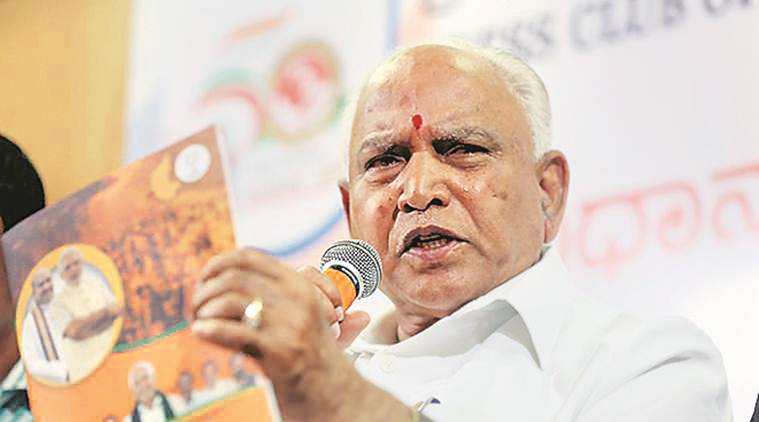 Yeddyurappa wants the JDS-Congress government in Karnataka to fall as soon as possible, but BJP’s central leadership wants it to continue till the LS polls.
Yeddyurappa wants the JDS-Congress government in Karnataka to fall as soon as possible, but BJP’s central leadership wants it to continue till the LS polls.
Two years ago, the BJP set its sights on the southern states, aiming to increase its electoral presence and compensate for possible losses in the Hindi belt. However, internal power struggles and failure to highlight issues to influence voters in the region seem to be casting a shadow on its efforts.
BJP president Amit Shah and his core team members had in September 2016 identified around 115 seats from the states that had not been the party’s strongholds, including the “theatre of war” of Andhra Pradesh, Telangana, Tamil Nadu and Kerala, apart from the eastern and Northeast states. Shah has made multiple trips to these states, worked on strengthening the organisational set-up and directed state leaders to work unitedly.
A Union minister who was in-charge of a southern state said that the party’s national leadership had to instruct leaders in Andhra Pradesh, Telangana and Karnataka not to hold individual press conferences or give interviews to local media, an exercise that had done “more damage to the party than publicity for its work”.
In poll-bound Telangana, confusion among the cadres over the party’s political position has added to BJP’s woes. While the party is going solo for the December 7 Assembly elections, and leaders including Shah are attacking the ruling TRS publicly, the TRS’s stand on various issues indicates that it remains a friendly party with which the BJP could forge a pre-poll or post-poll understanding in the Lok Sabha elections.
In Andhra Pradesh, the state unit is not united, said a party leader. “The party is still facing the ire of the people over special category status. The state unit has not been able to zero in on issues that could influence voters positively. The main players will be TDP and YSRCP, and BJP is unlikely to forge a pre-poll alliance with YSRCP,” said a party leader.
The BJP is in a comparatively formidable position in Karnataka, and hopes that “contradictions” in the ruling JDS-Congress coalition could brighten its prospects in the Lok Sabha polls. Party sources, however, said the “constant tussle between the interests of the state unit and the Centre” has prevented the party from creating a popular sentiment against the state government.
While senior party leader and former chief minister B S Yeddyurappa and his associates want the H D Kumaraswamy government to fall as soon as possible, the national leadership wants it to continue till the General Election so that BJP can cash in on the anti-incumbency factor, sources said. The national leadership’s stance has “disappointed” a section of the state unit and “it is visible in the state BJP’s performance”, said a senior party leader.
In Tamil Nadu, the emergence of T T V Dhinakaran-led AMMK as an electoral force could play spoilsport for the BJP. The BJP has been working on forging an alliance with the ruling AIADMK, but its prospects look fairly dim with an intense power struggle within the party. Political observers said that while DMK had almost ruled out alliance with the BJP, Dalit parties, like VCK, may be looking for secular formations.
The BJP’s faction-ridden Kerala unit also has not been able to make a deep impact on its electorate. After the initial confusion, the party has wholeheartedly backed the protests against the Sabarimala verdict, but this may not give the BJP an electoral advantage.
The Congress has also jumped on the protest bandwagon. The CPM-led government has agreed to engage in talks with community leaders before implementing the apex court order.